
Joint Research Units
26

Research Units
14

Research Federations
3

Federated Research Structure
1
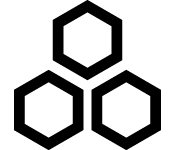
Research Support Units
4

Nantes Université
Oniris VetAgroBio Nantes
Nantes Université, CNRS
Oniris VetAgroBio Nantes
Oniris VetAgroBio Nantes
Oniris VetAgroBio Nantes
Nantes Université
Nantes Université, CNRS
Oniris VetAgroBio Nantes
Nantes Université, Ecole Centrale de Nantes
Nantes Université
Nantes Université
Nantes Université, CNRS
Nantes Université, CNRS

The Rencontres R, organized under the auspices of the French Statistical Society1 (SFdS), aims at bringing together a primarily (but not exclusively) French-speaking community of users of the R programming language in the broadest sense. This encompasses statistics, data analysis, machine learning, artificial intelligence, data processing, communication tools, etc., across all disciplines. R (and the working environment it represents) is one of the most widely used programming languages for analyzing data from all disciplines (life sciences, chemistry, physics, medicine, pharmacy, computer science, economics, psychology, engineering, actuarial sciences, business, etc.) in both the public and private sectors. It is a free, open-source and multi-platform software. Its source code is open and a large community of developers contributes to its growth. In January 2025, the main distribution site for R extensions2 had more than 22,000 packages. The community consists of academics and scientists as well as stakeholders from the public and private sectors and non-governmental organizations.
The Rencontres R began in Bordeaux in 2012 and have taken place annually, with few exceptions. They have been held in major French cities (Bordeaux 2012, Lyon 2013, Montpellier 2014, Grenoble 2015, Toulouse 2016, Anglet 2017, Rennes 2018, Paris 2021, Avignon 2023, and Vannes 2024) and last year in Belgium (Mons 2025). It is the largest French-speaking event of its kind in Europe. At each edition, between 150 and 220 people exchange their work and perspectives. Beginners are as welcome as experienced R users. The community is characterized by great openness. After a magnificent conference last year in Mons, Belgium, a neighboring French-speaking country, Nantes Université, and in particular the Department of Mathematics Jean Leray, is organizing the 2026 edition over five half-days from June 16 to 18, 2026. A Julia programming language training session will likely be organized at the same location prior to the Rencontres on June 15, 2026. An R Dev Day will take place at the same location on June 19, 2026, to offer participants the opportunity to extend exchanges in a more informal setting and discover other facets of the R ecosystem, such as contributing to R’s source code or its core packages. Following previous editions aimed at providing the R user community with a meeting and sharing space to develop new collaborations, the 2026 edition will welcome national and international speakers invited to share their experience and expertise with both novice and expert audiences in various fields including health, environment, archaeology, etc.
The organization of Rencontres R is guided by a steering committee (SC). This committee’s role is to ensure that the conference format remains each year in the same spirit as what was envisioned at its creation in 2012. In particular, the SC ensures that registration fees remain accessible to the entire community, that the people involved in organizing and programming are different each year while maintaining a balance between academia/industry and men/women, as well as diversity in the topics covered.
The local organizing committee (OC) handles the various practical aspects of conducting the Rencontres R, while ensuring continuity in the spirit of Rencontres R. The smooth running of the conference will also be ensured by the staff of the logistical support committee.
The scientific committee (SC) defines the program for oral presentations and poster communications. It ensures the balance and quality of interventions across the different themes that constitute these Rencontres R. It selects invited speakers. It reviews contributions in the form of communications and posters. It establishes the list of sessions and their schedule. In particular, it ensures that the community is inclusive and balanced, notably between beginner and more experienced participants, but also in terms of geographic diversity, gender, experience, and career level. It is composed of members from different backgrounds (different universities and companies).
Nantes Université (formerly University of Nantes until 2022) was created in its current form in 1961, succeeding, almost two centuries later, the ducal university of Brittany founded in 1460 in Nantes by Francis II, Duke of Brittany and dissolved in 1793. Figure 1 illustrates the ducal university.
Since 2022, Nantes Université has integrated École centrale de Nantes, ENSA Nantes and the Nantes and Saint-Nazaire School of Fine Arts as constituent institutions, and associates with its governance the IRT Jules Verne, the Nantes University Hospital and INSERM. Figure 2 summarizes the current organization of Nantes Université.
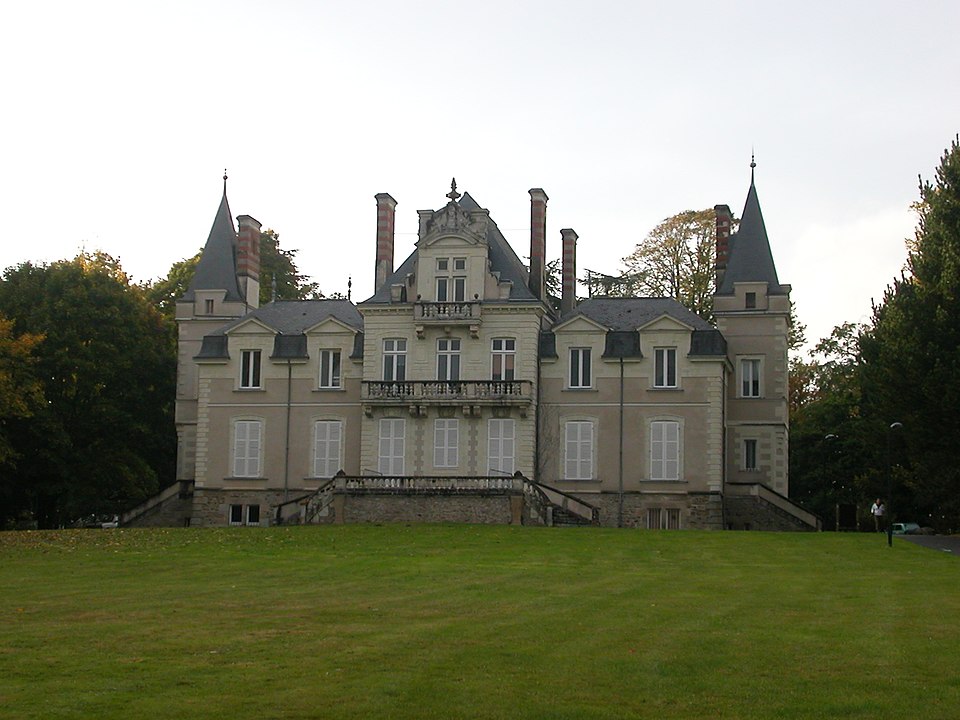
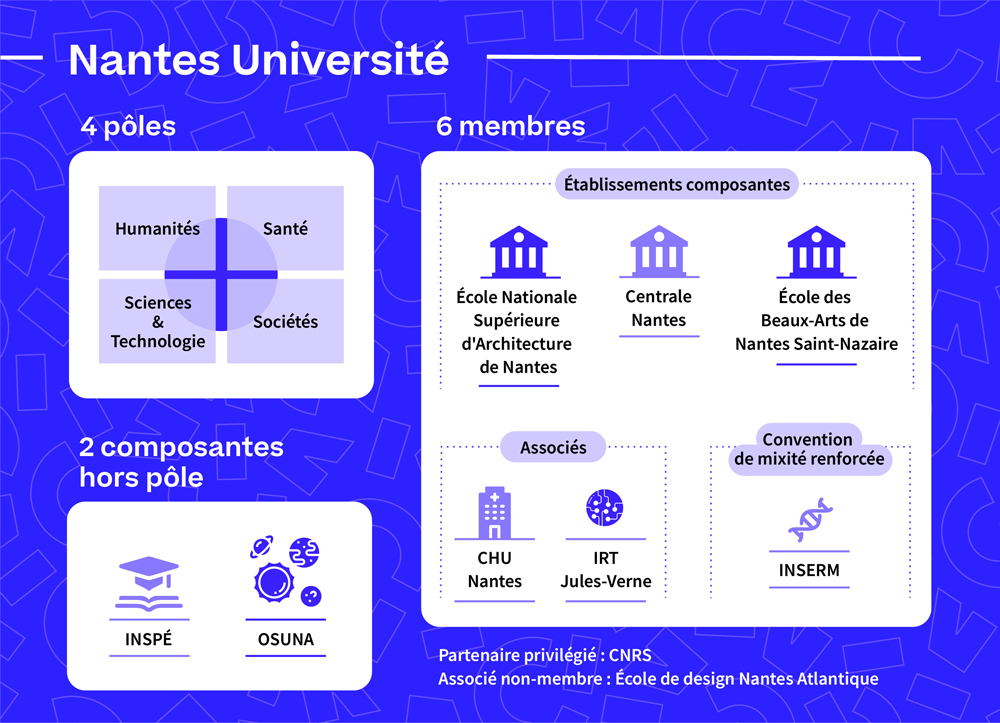
Nantes Université is composed of 4 clusters that bring together components and research structures:
These 4 clusters include:

26

14

3

1

4
Nantes Université is organized across 12 campuses spread over 3 cities. It hosts 42,500 students, 5,750 staff members including 3,225 teacher-researchers and researchers, and 2,525 administrative and technical staff, along with 1,200 doctoral students3. The university is strongly committed to lifelong learning and the internationalization of its activities. It develops partnerships with numerous foreign universities and welcomes over 5,000 international students each year. From a research perspective, Nantes Université is very active in numerous scientific fields. It is particularly recognized for its work in applied mathematics, computer science, physics, chemistry, life sciences, and humanities and social sciences. It also develops interdisciplinary research, notably in the fields of health, environment, and digital technology. Students and researchers at Nantes Université benefit from a dynamic and innovative environment, with numerous research laboratories, resource centers, and cutting-edge infrastructure. Students have a wide choice of programs, ranging from bachelor’s to doctoral level, in varied fields such as sciences, technology, humanities and social sciences, law, economics, and management4. For example, students can choose from about a hundred possible master’s programs.
The Rencontres R 2026 will take place in Nantes, a dynamic and cultural city known for its historical heritage, green spaces, and quality of life. The city offers an ideal setting for students and researchers, with numerous cultural, sports, and social activities. The university is spread across several campuses in the city, each with its own characteristics and specialties. The conference will be held at the Faculty of Science and Technology on the Lombarderie campus, located north of Nantes city center, approximately 25 minutes by tram from the SNCF train station and only 15 minutes from downtown. The Blaise Pascal amphitheater and the Pasteur amphitheater will host participants throughout the conference. Figure 3 presents some views of the facilities that will accommodate all participants. Other amphitheaters equipped with power outlets will be used for tutorials and the few parallel sessions, if any. The university cafeteria is located in immediate proximity to the amphitheaters. The campus is easily accessible by public transportation, with several tram and bus lines serving the area. Car access is facilitated by the availability of a large parking lot nearby.
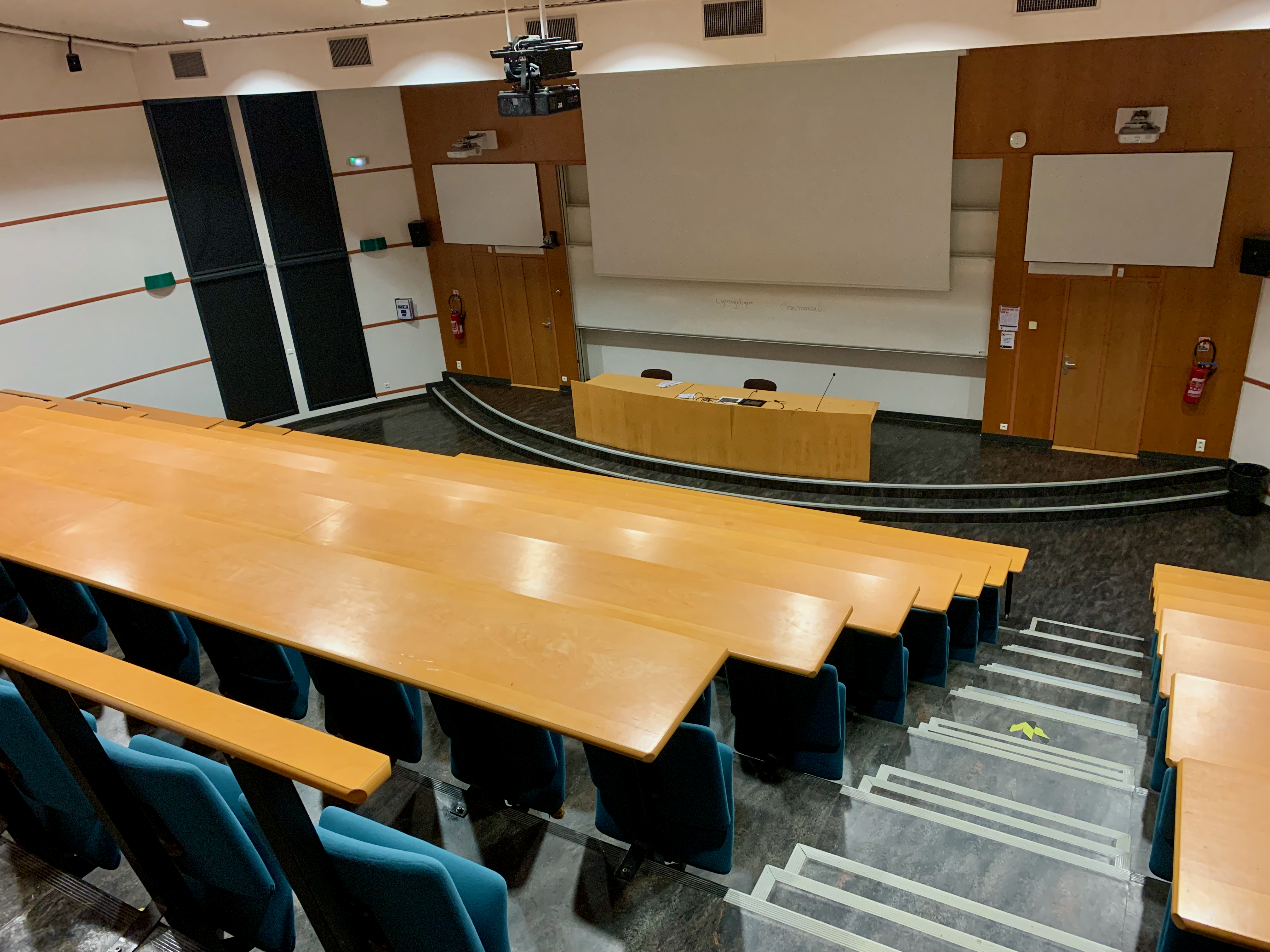
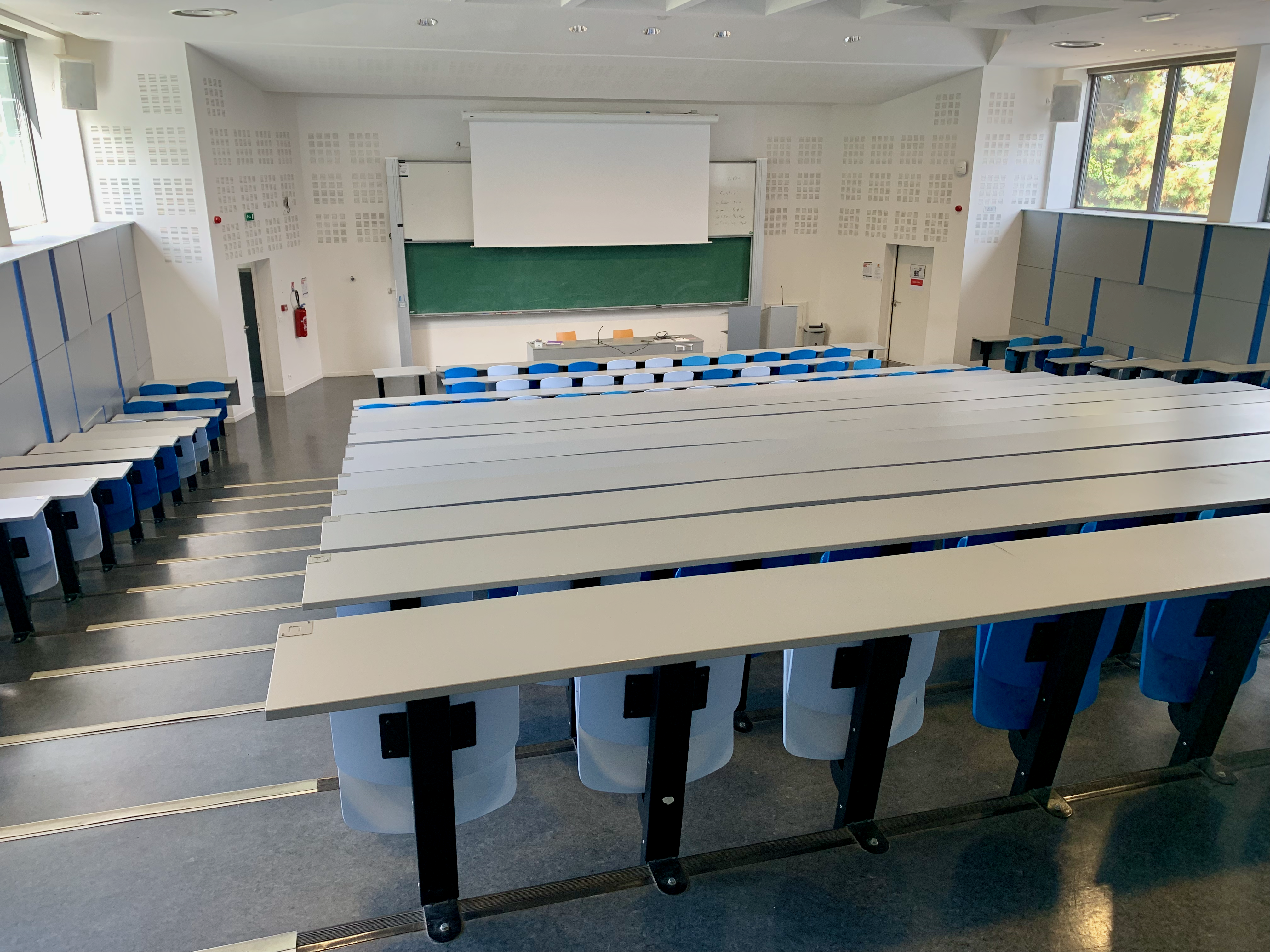

The 2026 edition remains faithful to the format adopted by Rencontres R thus far. It will be an event taking place over five half-days and consisting of:
The invited speakers will be chosen by the Scientific Committee ensuring geographical diversity, gender, experience, and career level balance, and will include international speakers. The detailed program following these main lines will be established by the Scientific Committee from September 2025 onwards. We will be sure to provide you with an updated version of this document when the scientific program is finalized.
L’édition 2026 reste fidèle au format adopté par les Rencontres R jusqu’ici : une manifestation qui se déroule sur cinq demi-journées et constituée de :
Le programme insistera sur le développement logiciel dans différentes orientations, sur l’enseignement et l’apprentissage de R, sur son utilisation en écologie, en sciences humaines, en médecine et dans d’autres disciplines. Aussi, cinq thématiques générales sont mises en évidence lors de cette édition :
En outre, les contributions sont les bienvenues dans les champs suivants :
Les contributeurs issus de tous pays sont encouragés à participer. Le français sera la langue principale, mais l’anglais est également accepté.
Les tutoriels porteront sur les thèmes suivants :
Les conférences plénières programmées sont les suivantes :
More information about Rencontres R 2026 will be available on the website https://rr2026.sciencesconf.org/. You can also consult the sites of previous events: https://rr2025.sciencesconf.org, https://rr2024.sciencesconf.org and https://rr2023.sciencesconf.org.
All international scientific events, because they bring together a large number of people in one place, have a significant ecological footprint. It is a tradition of Rencontres R to minimize this footprint as much as possible. The organizing committee is committed to encouraging the use of the least polluting means of transport, particularly in terms of carbon budget (train preferred). Our green campus with large spaces dedicated to biodiversity has a sustainable development policy and waste recycling. No non-eco-recyclable goodies will be distributed. We also favor an eco-responsible approach regarding the catering offered to participants (lunch, coffee breaks, and gala dinner).
All committees (steering, organizing, and scientific) have been composed ensuring gender balance (50% women for the SC, 50% for the OC, and 37.5% for the SC). We are committed to continuing this approach in the selection of invited speakers and presenters for oral communications.
Rencontres R is partly funded by participant registration fees. However, registration fees are intentionally kept very low to allow as many people as possible to participate. Additional support from public and private sector partners is essential for the successful organization of this event.
As the French Statistical Society is recognized as a public utility organization, sponsorship may be eligible for tax deductions in France under articles 200 and 238 bis of the General Tax Code. The minimum requested amount is 500 euros, with one free registration for the entire event offered per 1,000 euro increment. Depending on the amount, you can receive recognition for your organization on conference materials (website, program, signage, social media, booth).
The different formulas we can offer are divided into three tiers summarized in Table 1:
| Package & Rate | Description |
|---|---|
| Bronze: 500-999 euros | Logo + URL on website, Logo and name on program |
| Silver: 1,000-1,999 euros | Bronze + 1 complimentary registration + LinkedIn promotion |
| Gold: 2,000+ euros | Silver + logo slide during conference/breaks + 1 complimentary registration |
Regardless of the amount, a booth will be made available upon request. For any request or information about sponsorship possibilities, booths, or other possible actions, please contact the organizing committee at the following address: mailto:rr2026@sciencesconf.org (see also the “Contact Information” box at the beginning of this document).